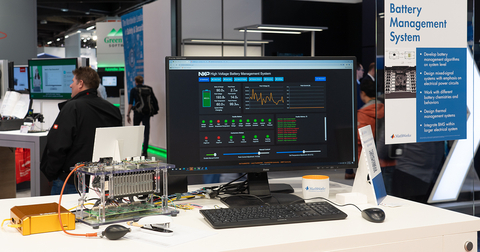New Toolbox Streamlines Battery Management System Design, Testing, and Algorithm Deployment Workflows on NXP Processors
NATICK, Mass. — (BUSINESS WIRE) — November 13, 2024 — MathWorks, the leading developer of mathematical computing software, and NXP® Semiconductors, the worldwide leader in automotive processing, announced the availability of the Model-Based Design Toolbox (MBDT) for Battery Management Systems (BMS). The toolbox enables engineers to model, develop, and validate BMS applications in MATLAB® and Simulink®, automate C code generation from MATLAB for NXP Battery Cell controllers, and also support NXP’s software solution, the BMS SDK components.
This press release features multimedia. View the full release here: https://www.businesswire.com/news/home/20241113886060/en/

MathWorks and NXP® Semiconductors announced the availability of the Model-Based Design Toolbox (MBDT) for Battery Management Systems (BMS). The toolbox enables engineers to model, develop, and validate BMS applications in MATLAB® and Simulink® automate C code generation from MATLAB for NXP Battery Cell controllers and also support NXP’s software solution, the BMS SDK components. (Photo: Business Wire)
BMS is crucial for EVs as it ensures the optimal performance, durability, and safety of the battery packs that power these advanced vehicles. The BMS design process increasingly relies on modeling and simulation to fine-tune algorithms tailored to EVs' specific battery cell types and battery pack configuration. Model-Based Design enables the efficient design of the BMS algorithms, providing a means to test them in simulation for different scenarios, such as driving habits, environmental conditions, and fault occurrences. MBDT for BMS makes it easy for engineers to transition directly from Simulink models to running and testing their BMS algorithms on an NXP processor. This capability simplifies the BMS development process and accelerates the prototyping and testing phases.
"We’re excited to collaborate with MathWorks to support automotive engineers in developing the next generation of BMS solutions," said Lars Reger, CTO at NXP Semiconductors. “Simplifying direct testing with MBDT on NXP processors offers a broad range of benefits, including faster design iterations that allow engineers to identify and fix issues upfront in the design process and reduce time to market.”
The MBDT for BMS solution bridges the gap between theoretical design and practical application. Engineers can directly implement their Simulink BMS models onto NXP processors without any manual coding, thereby preserving the integrity and efficiency of their original algorithms. In addition, the MBDT BMS product features integrated Input/Output (IO) connectivity. This functionality allows engineers to perform dynamic, real-world testing on their BMS systems, providing immediate feedback from early hardware prototypes and insights into system performance under various conditions. This level of testing is critical for ensuring the reliability and safety of BMS solutions in real-world scenarios.
"By enabling engineers to go directly from creating BMS algorithms in Simulink to running them on an NXP processor, we're simplifying and accelerating the development process," said Jim Tung, MathWorks Fellow. “The growth of the EV market demands more efficient, reliable, and safer battery systems, and tools like MBDT that streamline and enhance the engineering process will be critical. Reducing development times, facilitating easier testing, and accelerating market entry will be differentiators in this competitive market.”
For more information on NXP and MathWorks products, please visit www.mathworks.com/nxp.
About MathWorks
MathWorks is the leading developer of mathematical computing software. MATLAB, the language of engineers and scientists, is a programming environment for algorithm development, data analysis, visualization, and numeric computation. Simulink is a block diagram environment for simulation and Model-Based Design of multidomain and embedded engineering systems. Engineers and scientists worldwide rely on these products to accelerate the pace of discovery, innovation, and development in automotive, aerospace, communications, electronics, industrial automation, and other industries. MATLAB and Simulink are fundamental teaching and research tools in the world’s top universities and learning institutions. Founded in 1984, MathWorks employs more than 6,500 people in 34 offices around the world. For additional information, visit mathworks.com.
MATLAB and Simulink are registered trademarks of The MathWorks, Inc. See mathworks.com/trademarks for a list of additional trademarks. Other product or brand names may be trademarks or registered trademarks of their respective holders.
View source version on businesswire.com: https://www.businesswire.com/news/home/20241113886060/en/
Contact:
Press
Tim Morin
MathWorks
+1-508-647-3048
mediarelations@groups.mathworks.com